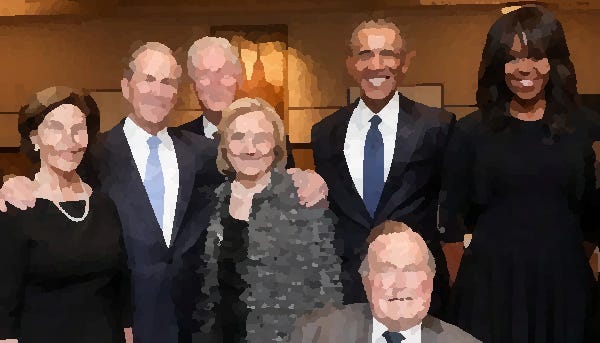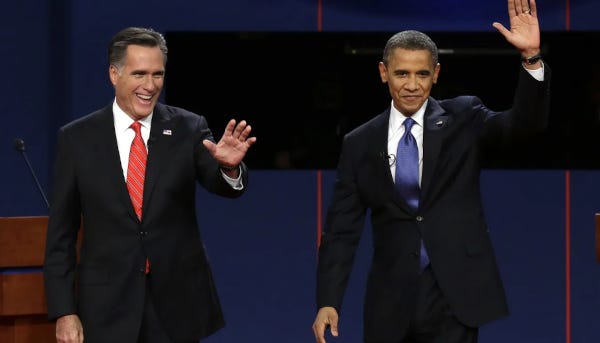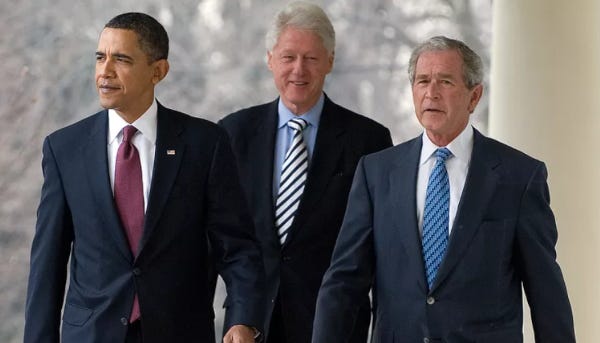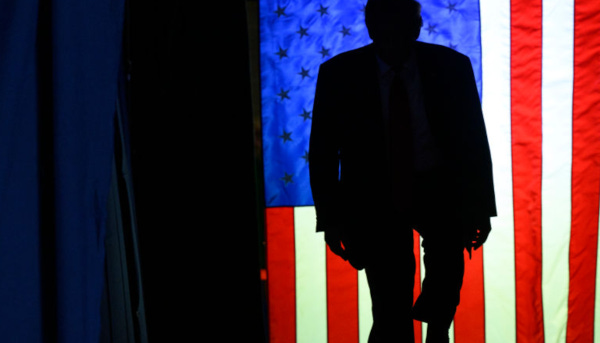Part I of this essay can be found here.
The Origins of The Regime
From 1962 through 1988, the United States was ruled by elected officials who ascended to power only with the support of a plurality of the same group of power brokers. Since those power brokers were the same regardless of whether the President ran on the Republican or Democrat ticket, it would be easy to conclude that the ruling elite and its regime have held power since 1962–after all, both candidates needed the support of at least some of those power brokers to win. Those resemblances are more superficial than real-the power brokers were a diverse group, their ranks consistently turned over, and competition for their support was fierce. They were not a unified or consciously self-aware political force.
In addition, even though each party offered a competing vision, each also viewed its opponent as the loyal opposition–taking for granted that it shared the same commitment to the nation’s interests and founding principles. The two parties believed they shared the same ends, and that they were both advancing America’s interests. They differed only on means. Or so they thought.
This meant that back then Democrats could say pro-American things, even borderline nativist things, that today would be completely out of character, leaving one to wonder “what happened to the Democrats?” What happened was that they simply followed the dictates of their progressive ideology to its logical conclusions. Prior to 1992, however, the necessarily anti-American, anti-constitutional, and anti-human principles latent in progressive utopian ideology had not fully come to light–though they were inevitable.
Thus, between 1962 and 1988, the nation was still sufficiently close to its founding principles (though post FDR it was way off track), that the parties could plausibly believe they shared the same ends, while offering significantly different means.
Today, however, the major political parties are in exactly the opposite position–their means and ends are functionally identical yet they pretend to offer competing visions for the country. And, both are unified by one thing: their commitment to preserving and advancing the power of the ruling elite and The Regime. The appearance of difference is maintained as an essential propaganda tool (about which more in Part III). In both cases, they care little (Republican) or not at all (Democrat) about the nation’s interests.
There are apparent exceptions: for example, on the Republican side, Congressman Matt Gaetz has developed a refreshing knack for exposing the farce that Republicans supposedly oppose The Regime’s agenda. On the Democrat side, Congresswoman Ilhan Omar believes that her third-world tribal loyalties trump any putative loyalty to the ruling elite or The Regime (and certainly to America). Her responsibility, she insists, is to “protect the interests of Somalia from inside the U.S. system.”
Weirdly, Gaetz and Ilhan Omar are the same in the limited sense that both serve interests that oppose the ruling elite and The Regime: the former a possibly futile endeavor by a patriotic Congressman to restore America; the latter a loathsome and treasonous effort by an imported third-world ingrate to destroy it.
What changed?
The Ruling Elite Becomes Self Aware
Short answer: the greatest generation exited the stage, the Cold War ended, the boomers came of age, and information technology accelerated political change.
Though a Republican, George H.W. Bush was the embodiment of the twentieth-century’s progressive worship of technical competence in government. He was highly educated, highly skilled, and highly experienced. He attended Phillips Academy and Yale, served in Congress, was Ambassador to the UN, and Director of the CIA, all before serving eight years as Vice President.
These qualifications would have made him a progressive’s dream candidate. But he was also a naval aviator and World War II veteran with substantial combat experience, which, by the 1980s, made him a Republican. Thus, even though George H.W. Bush ascended to the Presidency with the aid of an established elite, he was not really regime-approved, since The Regime did not exist–at least not in its current form. For the reasons I described above, the major parties saw themselves as distinct and were, in many respects, actually distinct.
But, Bush was old and his Cold-War era intelligence experience seemed less relevant after the fall of the Soviet Union. Thus, in 1992, the most irresponsible generation in human history saw an opportunity to stretch its proverbial if narcissistic wings–a task for which Bill Clinton was perfectly suited.
As had been the case for the preceding 30 years, Clinton’s platform appeared to seek the same ends as his Republican competitor’s, differing only on means. In an ordinary election, this meant that the nation’s trajectory would be the same regardless of who was elected–the loose administrative state and associated power brokers would “win” without realizing they were a political cohesive unit.
But something unexpected happened. For the first time, they had to struggle (albeit modestly) to ensure that at least one of the major party candidates defeated the quirky independent Ross Perot, who ended up with 19% of the popular vote.
Perot had the audacity to suggest that The Regime ought to be disempowered and humbled. In doing so, he revealed that unlike the approved candidates of the major parties, he was not regime-approved, much as Donald Trump and Robert F. Kennedy Jr. are not regime approved today. At any rate, it was the fact that the ruling elite had to struggle even modestly to ensure its success that caused it to become aware of itself as a politically coherent force. Thus, the modern ruling elite became self-aware around 1992, just as the boomer generation pushed their aging predecessors from the stage.
With its growing self-awareness and 1992 presidential victory, the ruling elite began to consolidate its control of legacy media institutions. It also began intentionally to build “The Regime” by coordinating the actions of its growing mandarins in high finance, big law, legacy media, academia, and, soon thereafter, big tech. From then through 2016, the ruling elite ensured that every presidential election was a contest between two regime-approved candidates.
Over the next 24 years, the ruling elite generally preferred candidates of the left. But, it sanctioned the “election” of regime insiders nominally on the right. Accordingly, in the ensuing two-plus decades of unchallenged regime rule, the Republican party pretended to oppose the Democrats, while faithfully vomiting up candidates who could pass as regime insiders. Those who supported zero borders, cheap labor, and globalization, those who equivocated about fundamental cultural issues, and those who justified forever wars on national security grounds, were all acceptable to the ruling elite and The Regime. Examples include John McCain in 2008 or Mitt Romney in 2012.
The Regime was willing to give its approval to “Republican” candidates provided they gave assurances they would protect and promote The Regime and the ruling elite’s power. They were allowed to speak inflammatory rhetoric to the conservative base, provided they understood it was simply rhetoric. If elected, The Regime did not allow them to do (and, in fact, they didn’t do) anything to threaten the ruling elite’s control of the administrative state, intelligence community, big law, legacy media, high finance, or big tech–any of the fulcrums upon which the ruling elite leveraged its power. In short, the Republican “opposition” always worked to sustain The Regime even at the expense of the nation’s interests.
Win The Presidency With This One Simple Trick
The key here is to understand that prior to 2016 our national elections were rigged even though The Regime didn’t know which of the two approved candidates would win the election. It didn’t know, because it didn’t matter.
It’s difficult to overstate the ingenuity behind this incredibly simple subterfuge–it’s what makes our system seem authentic. Not knowing who would win made it appear to normies that participatory democracy was happening–that everything was legitimate. And in a one-dimensional sense, it was legitimate. Votes were cast and counted and elections were certified, more or less “fairly.” A winner was declared. The process was not corrupt, but the substance was, a problem I wrote about in Show Trial, American Style.
As I explained in part I, it’s obvious to Americans that an election is rigged when a third-world autocrat receives 98% of the vote; but, for more than 24 years, Americans did not understand that The Regime was rigging elections by running two seemingly opposed candidates who, come the election, would receive 51% and 47% of the vote.
Take as an example the outcome of flipping a fair coin in a game of chance–the outcome is uncertain and depends on the flip. It could land heads or tails–and the result matters. The uncertainty in the flip is connected to the substantive legitimacy in the game of chance. After 1992, however, it didn’t matter whether the coin landed heads or tails, only that it didn’t land on something else.
This indifference to the coin flip–heads they won, tails they won–was the position into which The Regime had maneuvered itself by vetting and sanctioning the candidacy of both major parties since at least 1992 and ensuring there was no serious third-party candidate since 1996. Having done so, it had little need to resort to the more obvious forms of election rigging and could leave to chance the actual voting. In short, it didn’t need to cheat the old fashioned way since both candidates were regime approved. The outcome simply didn’t matter.
In retrospect, it’s obvious that the six consecutive presidential elections prior to 2016 were contests between regime approved candidates. During that time, every social indicator trended towards the radical left, sometimes with reckless abandon (when a Democrat was president), sometimes at a slightly more measured pace (when the Republican was president).
Financial profligacy and debt soared, behavioral norms were gutted, foreign military excursions continued apace, constitutional law was destroyed, and, above all, wealth, power, and control were consolidated in the hands of the ruling elite. There was no opposition, just fast (Republican) and faster (Democrat) lurches leftward.
All of this came at the expense of the great body of yeoman Americans who remained resolutely–perhaps even naively–patriotic, even as their modest wealth was stripped, their proud history debased, their customs gutted, and their God mocked. They were almost completely disempowered.
Until 2016.
The Outsider
By 2016, The Regime had become extremely rich and unimaginably powerful by pillaging the country. During a three-decade relentless leftward march, it enriched itself by hollowing out America’s manufacturing on the now laughable pretense that Wall Street’s financial engineering allocated capital in a value-adding way.
It raped our national balance sheet with astonishing fiscal profligacy in pursuit of idiotic utopian scheming. It diluted cultural coherence by importing millions of third-world aliens–literally, people whose cultures are alien to and incompatible with ours–while ginning up justifications for them not to assimilate or even to learn English.
And it eliminated empirical standards of competence in wide industrial swaths on the demonstrably false pretext that “diversity is our strength.” I could go on.
The Regime’s arrogance grew in proportion to its power. And, in the absence of any serious challenge to its power, it also became increasingly incompetent. Having no serious challengers to its power, The Regime became detached from the moving forces of reality–there being no impetus to improve and no apparent cost to its imbecility. Soon, its ranks became filled with well-dressed, automaton-like word-slingers with limited or no real knowledge or skill. Later, they lacked even the ability to sling coherent words.
Having reached the dual peaks of incompetence and arrogance, and lulled into complacency by unchallenged power, The Regime was vulnerable to disruption. Disruption arrived in 2016, when something happened that The Regime did not intend-a counter awakening.
Say what you will about Donald Trump, one thing is clear: The Regime did not approve of or expect his candidacy. In failing to anticipate his rise, The Regime miscalculated at great cost to itself. Though Trump’s Republican primary win was an early indication that The Regime had erred, it wasn’t until election night in November 2016 that the scope of its error was apparent.
To be clear, its error was not that it failed to advance Hillary Clinton’s candidacy. No, the error was its failure to ensure that the Republican party nominated a vetted, regime-approved RINO hack. By failing to do this, The Regime found itself in the position of having to care who was elected.
It failed to do so and, as a consequence, 2016 saw the first truly contested election during the voting lifetime of anybody born after 1974 (who would have turned 18 in 1992).
If the ruling elite became self aware in 1992, the election of Donald Trump must be understood as the moment when a large plurality of ordinary yeoman Americans finally came to understand four things. First, that the ruling elite understood itself as a coherent political entity. Second, that it would sacrifice American interests to advance its own. Third, that it had been doing so for nearly 25 years. And, fourth, that the ruling elite was firmly in control, having built The Regime out of the nation’s power centers and staffed it with an obsequious class of mandarin managers and a grasping class of prole enforcers, as described in Part I.
In realizing the above, these awakened Americans became, themselves, a new political force, one that has quickly taken control of the Republican Party under Donald Trump. Now, that new political force is beginning to take aim at The Regime.
It is likely that a decisive battle-one way or the other-will be joined this year…
In Part III, I will describe the ruling elite’s growing use of lawfare and propaganda to control the American population and rig elections in the fallout of its 2016 election loss.
Author’s Request: If you enjoyed this essay, I would personally appreciate it if you would send it to your friends and ask them to subscribe. Thank you. Till next time.








